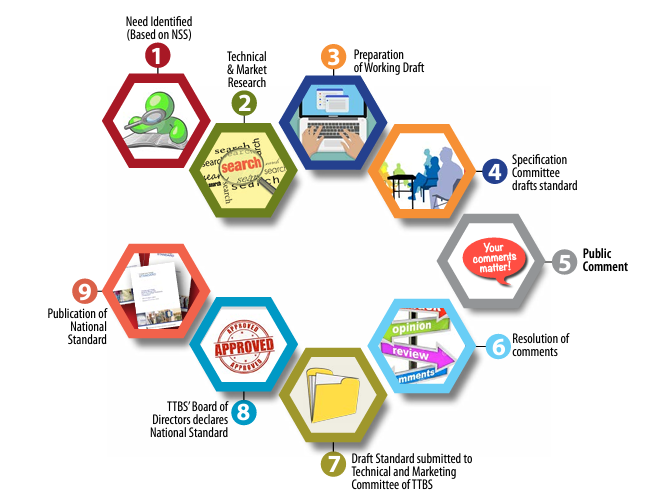Standards Development Process
TTBS’ Standards Development Process
TTBS develops National Standards based on the national needs and priorities as determined by the National Standardization Strategy (NSS) and based on requests from Stakeholders.
To submit a proposal for the development, revision, amendment or withdrawal of National Standards, please contact the Standardization Division of TTBS via email (standardization@ttbs.org.tt).
The TTBS’ Standards Development process is shown in Figure 1.

Figure 1 – TTBS’ Standards Development Process
Principles of Standards Development
It is well established in the community of nations that standards should meet societal and market needs and should not be developed to act as barriers to trade. In approving the World Trade Organization Technical Barriers to Trade Agreement, WTO members recognized that goal and established globally accepted principles as a framework to promote co-operation and discourage the use of standards as trade barriers. The TTBS standardization system is therefore based on the following set of globally accepted principles for standards development:
Transparency
Essential information regarding standardization activities is accessible to all interested
parties;
Openness
Participation is open to all affected interests;
Impartiality
No one interest dominates the process or is favoured over another;
Effectiveness and Relevance
Standards are relevant and effectively respond to regulatory and market needs, as well as scientific and technological developments;
Consensus
Decisions are reached through consensus among those affected;
Performance Based
Standards are performance based (specifying essential characteristics rather than detailed designs) where possible;
Coherence
The process encourages coherence to avoid overlapping and conflicting standards;
Due Process
Standards development accords with due process so that all views are considered and appeals are possible.
Flexible allowing the use of different methodologies to meet the needs of different technology and product sectors;
Timely so that purely administrative matters do not result in a failure to meet market expectations; and Balanced among all affected interests.
Standardization Work Programme
The Standardization Division produces a work programme every six (6) months which illustrates the stage that a standard has reached in its development.
Click here to view the Standards Work Programme
Public Comment Drafts
Prior to the finalization of a standard, the Trinidad and Tobago Bureau of Standards (TTBS) attempts to ensure that all stakeholders have a final opportunity to have any concerns regarding the draft standard addressed. This is done via a public comment period.
For draft standards with proposed Voluntary status a minimum period of sixty (60) days is given to submit comments, commencing on the first day in which the advertisement appears in the print media. Also, a minimum of sixty (60) days is allowed for commenting on draft standards with proposed Compulsory status. During this period copies of the draft standard are available for viewing by the public in the Standards Information Centre (where applicable) and via the TTBS’ Website.
The draft standard is advertised in the daily newspaper three times in a one week period.
To obtain maximum input from key stakeholders in industry, businesses, academia etc, we communicate information on the draft standard in several ways:
- Via the TTBS website
- Through Public and Stakeholder Consultations
Click here to view Public Comment Drafts
CARICOM Standards
Trinidad and Tobago standards can be recommended for CARICOM status through CROSQ, (Caribbean Regional Organisation for Standards and Quality). This means that the standard will become a regional standard and will be used by the CARICOM member countries.
The standard is sent to CROSQ and then sent to each CARICOM member state for comment. When the standard (with any amendments) has been agreed to by the member states, CROSQ declares the standard, a CARICOM Standard.
Trinidad and Tobago Bureau of Standards,
1-2 Century Drive,
Trincity Industrial Estate, Macoya,
Tunapuna,
Trinidad and Tobago W.I,
Tel: (868) 662-8827, Fax: (868) 663-4335
Email: ttbs@ttbs.org.tt
- Office of the TTBS Secretary (Main Ext: 2003)
- Certification Division (Main Ext: 2221)
- Implementation Division (Main Ext: 2417 / 2418 / 2419 / 2420 / 2421)
- Laboratory Accreditation (Main Ext: 2248)
- Laboratory Services Division (Main Ext: 2361)
- Metrology Division (Main Ext: 2307)
- Legal Metrology Inspectorate (Ext 2348)
- Standardization Division (Main Ext: 2041 / 2042)
- Standards Information Centre (Main Ext: 2033)
- Human Resource Unit (Main Ext: 2021)
- Operator (Main Ext: 0)
- Marketing Unit (Main Ext: 2261)

